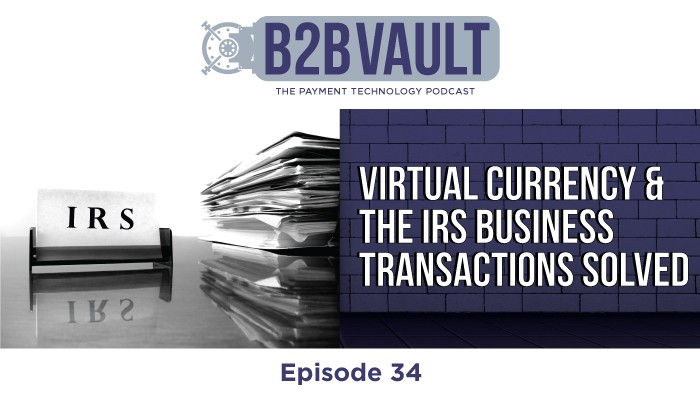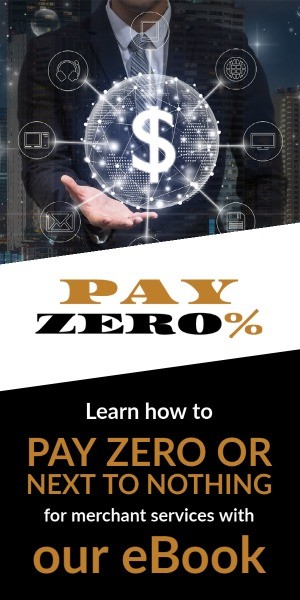

Written by admin
December 27, 2021



Video Transcription
Hey everybody. Welcome to the B2B Vault – The Payment Technology Podcast. Today we’re going to talk about virtual currency, and the IRS and NPS say business transactions have been solved for these new IRS rules. So let’s talk about what is going on at the IRS. Everybody knows there were these two infrastructure bills that were in Congress recently. So the first one, which was infrastructure/coronavirus relief. The bill passed contained the provision that by 2024, 2025, the IRS was going to figure out how to regulate virtual currency, AKA digital currency, Bitcoin doge, coin, Lite coin, Ethereum, et cetera, that they were going to wait until 2024 to 2025 to figure this out. Guess what surprise we got this article the other day and what is done? The 1040 from the IRS has a provision asking about tool currency.
So Justin, where are we at? And here’s a definition of the IRS. What do they say is a virtual currency. We’re going to post these links to a couple of these stories and links to the IRS, you know, um, uh, uh, advisory that they put out to, to what that is. So what is the IRS saying? They’re saying that transactions that are being compensated with crypto rewards, crypto mining, free coins, airdrops hard forks that’s when crypto is split into multiple branches and creates a new coin that all of this converting crypto to cash buying goods and or services converting one coin to another also qualify. So now the IRS is saying that this will have to be reported now before it was pretty much voluntary. And I can say that I paid my taxes. I sold Bitcoin, and it wasn’t straightforward. I had to get out of this whole spreadsheet and take all the transactions where I purchased my coin and load those onto this spreadsheet and calculate like, oh, I spent this much money and was, was the fee. And then this is how many coins that I had. And then I made a lot of purchases and then I had to take the selling. So how much did I sell it for? And then how much were the fees for selling it? And then what did I end up with cash wise? And then basically the, you know, what I invested was minus data there. So the original amount of investment, the, and then all the fees that I paid and the net were the capital gains. So, um, now it’s getting complicated because how will the IRS enforce this? Like, I have no unearthly idea. People take Bitcoin and sell it and buy Shibu coin or dogecoin with cooing coin to coin, um, things. And then people are doing, uh, Trent, you know, people buying goods and services. And so that complicates things. And you know, how is that going to be tracked? Because the IRS is basically saying that the companies who perform those transactions have until 2023 or 2024 to comply with the IRS rules.
You can Google IRS seizes, Bitcoin you’ll see that up until September of this year, they had seized the bank $3.2 billion of Bitcoin. And in fact, they started selling Bitcoin probably about 50 million a month. It was announced that they were trying to sell about 50 million of that a month. And that also took the price of Bitcoin from up in the 60,000 range down to now; I think today is, uh, somewhere between 48 and 50,000. And, you know, so they really, they affected the price of Bitcoin. It was reduced by 20% by them dumping into the, you know, putting that coin out there and getting the cashout. Cause obviously, they’re not spending any Bitcoin, so why is the IRS want it? They don’t want it. And that, you know, and basically in the rule with the IRS is saying is like, oh, well, we’re going to come, and we’re going to tax you now. And then you can prove later what was going on with that Bitcoin. Like, was it part of a business transaction where their expenses were involved with it and all that? So that’s pretty crazy. You know, I would be reviewing the rules. What are the tax consequences? If they’re not educated on cryptocurrency, I will be talking to my CPA; um, feel free. You can contact me. We know a few accountants are working with cryptocurrency, and we can steer you to somebody, you know, that’s working crypto. Maybe we even have a guest one day talk about crypto and taxes, but meanwhile, you know, we’ve solved that problem.
So let’s see the next slide where we have the 10 40 right now. So here’s the 10 40. And there’s the arrow that shows, have you, Anytime during 2021, did you receive sell exchange or otherwise dispose of any financial interest in any virtual currency? Yes. Yeah. So there, they’re looking for you, they’re looking at it, and they’re going to try to get there. You know, a lot of people probably avoided paying taxes, and what happens If you say no of them? Well, you know, it could get reported later when the reporting breaks out in 20 23, 20, 24, the reporting comes out and then it gets re and then it gets reported because they’re going to have to report the prior years. I mean, I know that Coinbase and some of the other ones are already sending out 10 90 nines, but I don’t know, they’re not really; they’re tracking, buying, and selling. They’re not tracking transactions, you know, business transactions. Cause some people can transfer wallets to the wallet. Like I get some from my wallet to another wallet. Now let’s say I’m using Coinbase. Coinbase is going to record that, that I liquidated the coin. So there are taxes what I do with it. They don’t care what you did with it, but you liquidated it. So you got to have records for all that.
So, you know, we solve the problem for this for businesses. So let’s say you’re a business and have customers who want to pay you with Bitcoin. We believe in the luxury market of jewelry, real estate, high dollar transactions. You are buying a luxury car, boating, yachting, you know, all kinds of things that involve high ticket items. It could be furniture, whatever it is that somebody’s buying and spending thousands of dollars Nightclubbing, you know, people go to clubs all the time and blow up a bottle room for 10, 20, 30, 40, 50 grand, you know so that it can be any transaction like that. So if you’re a business and want to have cryptocurrency, we solved the problem with the IRS. Because when we do, when we, when you facilitate a transaction using our service, the cryptocurrency is sold and turned into Fiat, cash, USD, Fiat. And then that money is deposited into your bank account. So you get a deposit, just like you’re getting a deposit from a merchant company. You declare that as income, and you don’t have to worry about, um, crypto going into a wallet. And then you are trying to figure out how to sell it because there’s no such thing as a business crypto wallet. Now, if any businesses come to us and say, well, we want to hold onto the crypto. Great. We give them the opportunity to open up a crypto wallet at the same service we have. And that way, your funds can go into the crypto wallet. And it’s separate from your wallet. So you’re not with the IRS. Always likes to think co-mingling of funds, you know, between business and personal, the IRS hates, you know, we don’t, you know, we don’t tell people to avoid taxes, but you can avoid, you know, problems by not having buy.
You can say you didn’t transact with any crypto people. They use their crypto; you got cash because our service converts it at the time of the, at the time, at the point of sale. So at the point of purchase, somebody scans a QR code, goes onto your website, makes a purchase, or you send them an invoice, and they click, and they put, they send that a one time use of dress into their wallet and then send the crypto across. When does the crypto travel across the network? It’s all being sold, cashed out, and cash is going into your bank account. So you’re not going to have to worry about crypto and paying taxes because if you were getting it into your crypto wallet, the IRS could come knocking on your door and say, Hey, you owe taxes on that. And you took a hundred thousand dollars worth of crypto. And then you say, oh, it was for my business. And then they’re going to go, well, we want 20%. And then you’re going to have to prove it. This takes all of that away, and you don’t have to deal with that. So that’s our, that’s our podcast for today about virtual currency, digital currency, Bitcoin, Lite coin. So all the coins now dubbed, uh, VR, virtual currency by the IRS that they’re naming it because they didn’t have a name for it before it was digital currency. They called it some other, you know, some other kind of name also, but now it’s dubbed virtual currency officially it’s on the IRS website, and it’s on the 10 40.
So thank you for listening today to B2B vault, the payment technology podcast. For more information, you can visit our website, B2B vault.info, or you can go to NPS bank.com/cryptocurrency and see, uh, more information about our cryptocurrency product. You can also follow the podcast on all the podcasts networks. And we have a lot of episodes about crypto, and they’re focused on specific industries. And you can find one in your industry, or you can listen to the podcast where we talk about the top 10 things about crypto and what you should know about it. So over and out, Carpe Diem, B2B Vault, have a great day, everybody.
SUBSCRIBE TO OUR NEWSLETTER
Related Articles
No Results Found
The page you requested could not be found. Try refining your search, or use the navigation above to locate the post.




